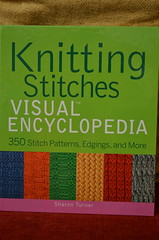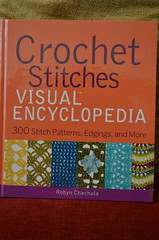First, the facts:
Title: Knitting Stitches Visual Encyclopedia: 350 Stitch Patterns, Edgings, and More
Author: Sharon Turner
Published by: John Wiley & Sons, 2011
Pages: 240
Type: Knitting stitches
Chapters:
1. Knit and Purl Patterns
2. Rib Patterns
3. Bobbles and Textured Stitches
4. Slipstitch Patterns
5. Twist-Stitch Patterns
6. Cable Patterns
7. Drop-stitch, Yarn Overs, Eyeles and Lace
8. Borders and Edgings
9. Creative Stitches and Combinations
10. Color Knitting
Title: Crochet Stitches Visual Encyclopedia: 300 Stitch Patterns, Edgings, and More
Author: Robyn Chachula
Published by: John Wiley & Sons, 2011
Pages: 272
Type: Crochet stitches.
Chapters:
1. Simple Stitch Patterns
2. Textured Stitch Patterns
3. Lace Stitch Patterns
4. Unique Lace Stitch Patterns
5. Colorwork Stitch Patterns
6. Tunisian Stitch Patterns
7. Square and Hexagonal Granny Squares
8. Flower, Snowflake, and Joining Motifs
9. Edgings
The In-Depth Look:
It’s hard not to love a good stitch dictionary, and both of these seem to be good, solid specimens. Firstly because they ARE. Solid that is. Hardcover with lots of color photos and a good solid feel in your hand.
Both come with clear color photos of each stitch, along with both written instructions and a chart. I know a lot of people feel very strongly about having one or the other, and personally I think it never hurts to have both though I use charts most often. As an aside, I was almost surprised to see charts in a crochet book. The last time I crocheted anything of any complexity–a baby afghan for my now-18-year-old nephew–charted stitch patterns simply didn’t exist. I have no comprehension as to how easy or hard it is to follow one, though I’m almost tempted to pull out a crochet hook and give it a try.
Both books come with a basic glossary at the back explaining the stitches and their charted symbols, but these are very basic explanations. These books are not going to teach you HOW to follow instructions or what a Treble Crochet or C4B cable is. That is, they give a brief description, but you need to understand the basic techniques before you get here…but that only makes sense. Stitch dictionaries are about opening the possibilities to be creative, and usually you don’t get to that point until you have an idea how the basics work.
All in all, both of these stitch dictionaries are great. They’re nicely organized and all the stitches are spelled out in the Table of Contents, which makes it so much easier to find a specific stitch. The stitches are grouped by types of stitches, which makes browsing easy, and the hardcover binding does a decent job of staying open while you work.
Are they worth looking into? Absolutely.
Want to see bigger pictures? Click here.

These review copies were kindly donated by John Wiley & Sons. Thank you!




Comments on this entry are closed.
This is very helpful, thank you! My daughter is learning to crochet, so it’s nice to know about resources that she could use.